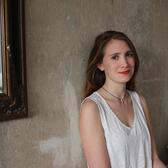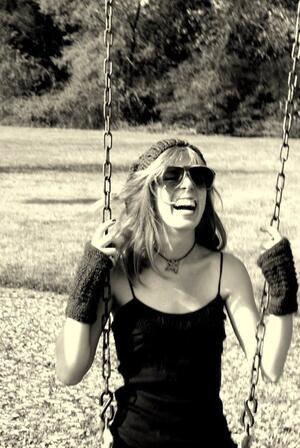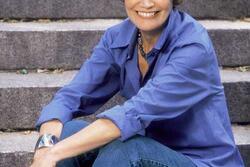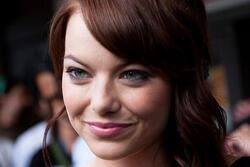Smashing the Patriarchy with YA Literature
If you’ve ever been a teenage girl, chances are you know what it’s like to hate your body. This isn’t an accident: when you’re born female in America, you immediately embark on a lifelong lesson on how to police your own body and the bodies of others.
Luckily, one of the reasons books and stories exist is to challenge the problematic narratives and assumptions embedded in our society. One of the reasons author Kendra Fortmeyer exists is to challenge the prevailing cultural message that girls should be ashamed of their appearances. Fortmeyer is an award-winning short story writer, a Jewish feminist, and a soon-to-be YA novelist: her debut book, Hole in the Middle, comes out on July 6, and tells the story of a teenage girl who was born with a hole in her stomach and decides to reveal herself to the world and deal with the repercussions. I chatted with Fortmeyer about feminism and YA publishing, the importance of Jewish representation in books about teenagers, and how she came up with the idea to write a book about a girl with a hole through her middle.
How did you come up with the premise of Hole in the Middle?
The seeds of obsession are often planted by accident, and Hole was one: I was lying on the floor after some dismal date (the details of which have been lost to time; the wretchedness has persisted) and thought to myself, Dating would be so much harder if I had a hole in my middle. That was it: I sat straight up, the first lines of the book already blurring through my mind.
At the moment I began writing, the idea seemed almost like a joke. Looking back, though, the central concept of the book—navigating the world as a snarky, boldly uncertain girl with a hole in her middle—sums up my teen years and early twenties with unnerving precision. Those are years that I spent yearning and striving for something I couldn’t articulate yet: wondering (as the protagonist does) what I was lacking, and how I could find it, so that I could become the self I hadn’t met yet but knew I needed to be. It’s no wonder I couldn’t let go of this weird little idea.
Your book deals with body confidence in a raw, intimate, and funny manner. How did you decide to write a book addressing these themes? Why do you think these are important themes for young girls to read about?
Girls in Western culture are trained since birth to believe that everything is wrong with our bodies. Our thighs are too big, our breasts too flat, our toes/eyebrows/labia/teeth are somehow so fundamentally flawed that we will never find happiness.
Hole’s protagonist, Morgan, has a truly problematic body: The eerie hole in her torso means she spends lots of time in and out of hospitals, navigating girl-bodyhood in the strangely up-close-and-impersonal medical industrial complex. But her preoccupation with her body isn’t too different from most girls’: Why was I born like this? Do I deserve it? Does it make me unlovable?
These are the questions that, if we are lucky, we kick in the teeth and leave behind us as we plow gloriously toward self-actualized adulthood. Writing this book, I got to write a character who kicks in the teeth of body-shaming and patriarchal beauty expectations with fierceness and aplomb –the greatest romance there ever was.
Young Adult, as a genre, barely existed a few decades ago, but these days it's the hottest style. As a feminist, how do you think this booming sector of publishing intersects with feminism? Can this growing genre advance the feminist cause?
Girls and young women are the biggest consumers of fiction, especially in the young adult genre—so perhaps it’s unsurprising that a 2015 count by Horn Book found that 65% of YA protagonists (in books released in the first half of 2014) were girls. Children’s publishing is like any industry, it follows the money—and while it’s still plagued by failures of diversity, heartening statistics like this reflect a growing awareness of audience’s desires. Girls and feminists reading books opens the door commercially for more stories about girls and feminists. In a political age characterized by a prolonged backslide into a regressive black hole, this is so important, and so comforting: Feminism and feminist literature are fires that will feed each other.
Morgan Stone, your protagonist, isn't the most actively practicing Jewish girl, but she's definitely one of the tribe, what with her references to synagogue and shiva. What made you decide to write a Jewish protagonist?
As a Reform Jew who grew up lonely in the Bible Belt, it would have meant the world to me to see more of myself in fiction, and to know that my friends and classmates (a well-meaning lot who were varyingly invested in trying to get me to come to church) saw me there, too.
Representation is so powerful. Even casual representation—even the slightest hint that the world is not default straight-male-white-cisgendered-able-bodied-Protestant—is a small revolution. If you’re a member of a minority, minority representation can remind you that you’re not alone. It shows you that you can have agency. If you’re a member of a majority group, minority representation can remind you to tread more carefully, to assume less, to open your mind more. It teaches us that the world can be more than what’s in our own heads—which, in an increasingly echo-chambered world, is more important than ever before.
JWA has a feminist fellowship called Rising Voices, which is a year-long education program for a cohort of teenage girls. If you could give our RVF fellows (and all feminist teens!) one piece of advice or wisdom, what would it be?
Pay attention. Think. Notice the way the world works and have a critical eye.
When you encounter a piece of media, ask yourself: Who is this made for? Who does this appeal to? What stereotypes does it perpetuate, or ask me to perpetuate as its observer? And who benefits from it? Being a feminist can mean reading Gertrude Stein and Judith Butler, but, more insistently, living as a feminist means never ceasing to ask questions: Why are there ten men on screen and only two women? Why are there no people of color? Why are books about suburban married life "women's fiction" when written by women and "the great American novel" when written by men? Why do we think it's cool or badass when little girls like boy stuff (motorcycles, trucks, etc) but not when boys like girl stuff (dolls, tutus, etc)? Who takes up space? Who interrupts whom? Who starts their sentences with “This might be dumb, but,” and who just starts talking?
Never stop being critical. Never stop noticing. It's a long game, but such an important one to play.







